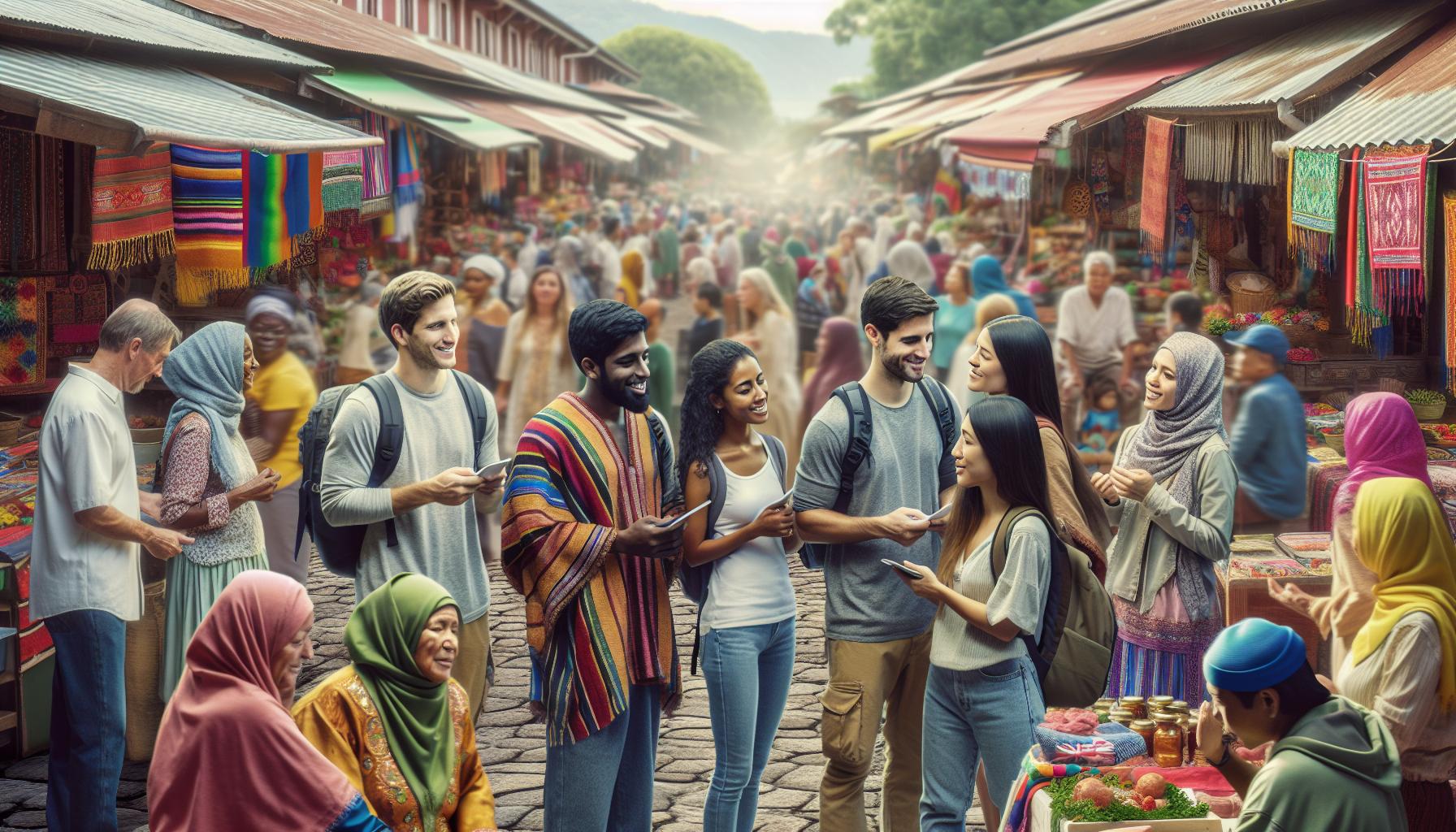Educational travel adventures offer a unique blend of exploration and learning, transforming the way individuals experience the world. From ancient ruins to vibrant cultures, these journeys ignite curiosity and foster a deeper understanding of diverse histories and traditions. It’s not just about visiting new places; it’s about engaging with them in a meaningful way.
Whether wandering through the bustling streets of a foreign city or hiking in breathtaking landscapes, educational travel opens doors to personal growth and global awareness. These adventures equip travelers with knowledge and skills that extend far beyond the classroom, making every trip an opportunity for discovery. Embracing educational travel can inspire a lifelong passion for learning and adventure.
Key Takeaways
- Unique Learning Experience: Educational travel adventures combine exploration with learning, allowing participants to engage meaningfully with diverse cultures and histories.
- Personal Growth: These journeys promote personal development by encouraging travelers to step outside their comfort zones, enhancing resilience and adaptability.
- Cultural Awareness: Traveling educates individuals about global customs and traditions, fostering empathy and breaking down stereotypes through direct community interaction.
- Diverse Opportunities: Various types of educational travel, such as student exchanges, volunteer experiences, and study tours, cater to different demographics and learning goals.
- Planning is Key: Successful educational travel requires careful planning, including selecting the right destination and budgeting effectively for transportation, accommodation, and activities.
Educational Travel Adventures
Educational travel adventures blend exploration with learning, enhancing experiences through active engagement. These journeys focus on cultural immersion, allowing travelers to connect deeply with local traditions, languages, and lifestyles. Participants encounter historical sites, attend workshops, and interact with community members, which fosters a richer understanding of global contexts.
Educational travel adventures cater to various demographics, including students, families, and professionals. Each group benefits differently; students gain academic knowledge, families create lasting memories, and professionals develop cross-cultural skills. This diversity highlights the versatility and appeal of educational travel.
Several key elements define educational travel adventures:
- Cultural Exchange: Participants engage in activities that promote understanding and appreciation of diverse cultures, such as cooking classes or traditional ceremonies.
- Experiential Learning: Travelers acquire hands-on knowledge through field studies, volunteering, or guided tours focused on specific subjects, such as history or ecology.
- Skill Development: Educational travel fosters critical thinking and problem-solving skills, as participants navigate new environments and engage with real-world issues.
- Personal Growth: Travelers often experience transformative moments that encourage self-reflection, adaptability, and resilience.
- Global Awareness: Exposure to different perspectives cultivates empathy and awareness of global challenges, fostering a sense of responsibility toward the planet and its inhabitants.
Educational travel adventures create unique opportunities for learning and exploration, providing lasting benefits. Such experiences contribute to individuals’ lifelong passion for knowledge, adventure, and cultural appreciation.
Benefits of Educational Travel

Educational travel provides numerous advantages that enhance personal and academic experiences. It offers opportunities for individuals to grow, learn, and connect with the world in meaningful ways.
Personal Growth
Educational travel fosters significant personal development. It encourages individuals to step outside their comfort zones, face new challenges, and build resilience. Engaging in unfamiliar environments promotes self-confidence and adaptability. Participants often report increased independence and problem-solving skills after navigating new cultural landscapes. Travel experiences also facilitate the development of leadership skills through group dynamics and collaborative activities.
Cultural Awareness
Educational travel enhances cultural understanding and empathy. It exposes travelers to diverse customs, languages, and traditions, fostering a deeper appreciation for global diversity. Participants interact with local communities, gaining insights into the daily lives and challenges of others. Such interactions promote respect and empathy, breaking down stereotypes and prejudices. Increased cultural awareness equips individuals with the knowledge to engage thoughtfully in a globalized world, making them more informed and responsible citizens.
Types of Educational Travel Adventures

Educational travel adventures encompass various experiences designed to enhance learning and personal development through exploration. The primary types include student exchange programs, volunteer travel experiences, and study tours.
Student Exchange Programs
Student exchange programs allow individuals to immerse themselves in different cultures while pursuing academic goals. Participants often study abroad for a semester or a year, fostering cross-cultural friendships and academic collaboration. These programs enable students to learn a new language, experience local customs, and gain insights into different educational systems, enriching their academic journey.
Volunteer Travel Experiences
Volunteer travel experiences combine service with exploration, enabling participants to contribute to community development projects while grasping local cultures. Volunteers can engage in activities such as conservation efforts, teaching, or healthcare support. Such experiences promote social responsibility, encourage teamwork, and provide practical skills relevant to various fields, enhancing personal and professional growth.
Study Tours
Study tours provide structured educational experiences focused on specific topics. These tours often include expert-led workshops, site visits, and hands-on learning opportunities related to fields like history, science, or art. Participants gain insights from industry leaders and specialists, enhancing their knowledge and skills. Study tours facilitate in-depth cultural understanding, allowing travelers to connect theoretical knowledge with real-world applications.
Planning an Educational Travel Adventure

Planning an educational travel adventure involves several critical steps that ensure a fulfilling experience. Detailed consideration of destination and budgeting plays a pivotal role in maximizing the benefits of the journey.
Choosing the Right Destination
Choosing the right destination hinges on individual interests and learning goals. Travelers should consider locations rich in cultural significance, historical relevance, or unique educational opportunities. For instance:
- Cultural Experiences: Cities like Kyoto, Japan, offer deep historical contexts and traditional practices.
- Natural Environments: Countries like Costa Rica provide insights into biodiversity and environmental conservation.
- Historical Sites: Locations such as Rome, Italy, immerse travelers in ancient history and architecture.
Adapting the travel itinerary to include local interactions enhances understanding. Engaging with community members, attending workshops, or participating in cultural events fosters meaningful connections and learning.
Budgeting for the Trip
Budgeting for the trip requires meticulous planning to cover various aspects of travel. Individuals should account for these key expenses:
- Transportation Costs: Look for economical flights or consider bus and train options for local travel.
- Accommodation Expenses: Choosing hostels, guesthouses, or homestays can provide cost-effective lodging while offering a glimpse into local life.
- Activity Fees: Research ticket prices for museums, tours, and workshops in advance to incorporate them into the budget.
Establishing a clear budget enhances resource allocation during the trip. It helps ensure that funds are available for educational pursuits, contributing to a more enriching travel experience.
Transformative Experience
Educational travel adventures offer a transformative experience that blends learning with exploration. By immersing themselves in diverse cultures and engaging in hands-on activities, travelers not only gain knowledge but also develop crucial life skills. These journeys encourage personal growth and foster a deeper understanding of global issues.
As individuals embark on these enriching experiences, they cultivate empathy and respect for different cultures. This newfound awareness equips them to navigate an increasingly interconnected world. Whether through student exchanges, volunteer opportunities, or structured study tours, the benefits of educational travel extend far beyond the trip itself.
Ultimately, educational travel ignites a passion for lifelong learning and adventure, shaping informed and responsible global citizens. Embracing these opportunities can lead to unforgettable memories and a profound appreciation for the world’s rich tapestry of cultures.